
GOALS is a project funded by EU Commission through the ERASMUS+ Sport Programme, that aims at improving the environmental governance in football organizations.
The project is aimed primarily at women and youth football teams with the aim of improving the environmental impact of clubs and football matches. GOALS aims to increase their environmental awareness and promote the adoption of more environmentally friendly behaviors. The project also intends to strengthen cooperation between institutions and sport organizations boosting the adoption and the implementation of environmental governance actions.
To these ends, GOALS will develop organizational tools for the three National Football Associations involved - Romanian, Portuguese and Kosovar - to improve their environmental governance. The project also focuses on operational governance through the involvement of at least 9 grassroots football clubs, 3 for each of the countries involved. In addition to the calculation of the environmental footprint of the clubs participating in the project, GOALS will provide an intuitive online tool to support football organizations in the calculation of their Environmental Footprint applying the European methodology on footprint (Recommendation 2013/179 / EU).
The project is coordinated by Sant’ Anna School of Advanced Studies, that has extensive experience in environmental management activities and environmental footprint assessment.
The project Consortium includes, in addition to the three participating Federations, Real Betis Balompié - the professional team of the Spanish Lega - and the international association ESSMA (European Stadium & Safety Management Association). This network comprises over 350 members that will contribute through communication, networking and replication activities, dissemination of project outputs and stakeholders’ engagement from the European world of football. Moreover, GOALS is supported by UEFA and by the Football Association of Ireland.
Project partners: Portugal Football Federation (FPF)Real Betis Balompié Foundation, Romanian Football Federation (FRF), Football Federation of Kosovo (FFK), European Stadium & Safety Management Association (ESSMA)
Project duration: 01.01.2021 to 30.06.2023




The International Biathlon Union (IBU) has introduced the IBU’s Sustainability Strategy with a bold plan to balance the social, economic and environmental impact of the sport of biathlon. The Strategy follows a profound process which began following the approval of the new IBU Constitution and strategic plan called “Target 26” in October 2019.
The new strategy triggered a process for future proofing and progressing the sport recognising sustainability as a key priority in Target 26 and climate change as direct and urgent threat to the sport of Biathlon.
In the interest of maximising stakeholder buy-in through the process, IBU involved all key stakeholders in this strategic process including the National Federations (NFs), staff, athletes, organising committees, commercial partners, media, and fans. This is also in line with ISO 20121 standard’s core requirements for sustainable management, which the IBU aspires to follow.
The IBU’s Sustainability Strategy was designed around five focus areas:
- Climate. IBU has committed to reduce its footprint 45% and become climate neutral by 2030 and climate positive by 2034, covering both IBU as an organisation and its own events. The main areas considered are travel and transport, energy consumption, food & beverage and snow management.
- Venue & Event. Biathlon venues and events are to have a long-term positive impact on their communities considering all activities and including the ban of single-use plastics and ensuring that all waste is re-used, recycled or composted.
- Sport. Ensure the sport has a minimal impact on the environment in particular to air, water and soil. This comprises, among others, a ban on chemical substances (such as the recent ban on fluorinated wax), minimising the use of resources on snow management, efficient uses of energy and keeping up with latest developments in salting and equipment.
- People. Leading by example on the forefront of better governance standards including gender equality and diversity. By focusing on structural strategies, IBU aims at making biathlon a youth and mass participation sport, mass participation, sport that includes and supports athletes at every level from grassroots to those who wish to combine the sport with a career.
- Communication and Awareness.
Amplifying the message by advocating for climate action and supporting sustainable development both within the sport and all other winter sports.
The IBU is determined to take a strong stance on making Biathlon an increasingly balanced and conscious sport on their impact on climate change, communities in which it operates its games, and its people.
BENEFITS
- By having a clear and thorough sustainability strategy, a federation can define the vision and align all stakeholders across its spheres of influence.
- The definition of what sustainability means to an organisation cannot be taken for granted. By establishing at an organisational level what is encompassed within that concept allows for a clear path for better planning and execution.
- The inclusion of all stakeholders in the making of the strategy aligns the goals and can lead to a stronger long-term buy-in.
Click here to download the case study











Created by the 11th Hour Racing Team, for the benefit of the wider community, a series of eight How to Guides and Case Studies are part of the TOOLBOX which is designed to make sustainability accessible for any organisation.
The eight Case studies relate respectively to :
- How to start your program
- How to create a policy
- How to engage stakeholders
- How to identify issues
- How to set targets
- How to plan and implement
- How to assess progress
- How to report and communicate
Click here to access the case studies list


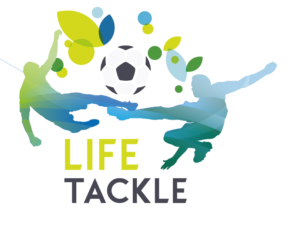
LIFE TACKLE is a project co-financed by the European Union aiming at improving the environmental management of football matches and the overall level of awareness and attention towards environmental issues in the football sector, engaging its most relevant stakeholders – National Football Associations (NFAs), Football Clubs, Stadiums managers and Supporters.
Sant'Anna School of Advanced Studies leads this project, and is assisted by a consortium of entities including ACR+ (Belgium), AMU Genova S.p.A (Italy), EURACTIV.COM LTD (UK), the Italian National Football Association (Italy), the Romanian National Football Association (Romania), LIPOR (Portugal) and the Swedish National Football Association (Sweden)




Achieving more together with Sport for Development
Project description
Title: Sector project Sport for Development
Commissioned by: German Federal Ministry for Economic Cooperation and Development (BMZ)
Countries: Colombia, Indonesia, Morocco, Tunisia, Uganda, Western Balkans (Albania, Bosnia and Herzegovina, Kosovo, North Macedonia and Serbia)
Overall term: 2019 to 2022
Context
Sport integrates and educates people and gets them moving. More than almost any other area, sport with its professional and voluntary structures reaches all social spheres, promotes participation and creates a feeling of togetherness across ethnic and social boundaries.
The 2030 Agenda confirms that sport makes a significant contribution to achieving the Sustainable Development Goals (SDGs). The project contributes to several SDGs, including good health and well-being (SDG 3), inclusive and equitable quality education (SDG 4), gender equality (SDG 5), decent work and economic growth (SDG 8), peace, justice and strong institutions (SDG 16), and partnerships for the Goals (SDG 17).
The project uses sport to achieve development policy goals. Sport includes all physical activities that promote physical and mental well-being and social interaction, from popular and recreational sports, games and exercise to traditional forms of culture and expression, such as dance.
Sport can have a particularly positive effect on the development of children and young people. They learn about fair and tolerant behaviour, strengthen their self-esteem and develop the willingness to take responsibility. Sport also teaches life skills – abilities that help individuals to master difficult life situations and develop perspectives for their own future.
The German Government has recognised this potential and is focusing on Sport for Development as a cross-cutting theme of German development cooperation (DC) in order to achieve other development policy goals. These include education, employment, the private sector and health along with goals in the context of displacement and migration.
Objective
The project uses sport in development cooperation to secure long-term improvement in the lives of disadvantaged children and young people.
Approach
In a wide-ranging network with partners and local and international organisations, civil society institutions, sports associations, companies and academia, the project implements a range of projects with the partner countries. The German Olympic Sport Confederation (DOSB), the German Football Association (DFB) and the German Sport University Cologne (DSHS) are among the over-arching partners.
The project trains trainers, invests in sports infrastructure with long-term use, such as sports grounds and sports centres, and campaigns for fairly and sustainably produced sportswear. It also creates areas of learning for children and young people and improves their prospects through initial and continuing training.
A central component is the development of training manuals. These describe the methodology and support local trainers and teachers in applying it. The project works with local partners to adapt the approach to the conditions in each country. The manuals contain numerous examples of training units in different sports that are adapted to different age groups and cover different sports and social education topics.
Other focal points include policy advice on content and strategy, the further development of the German contribution with long-term national and international positioning, academic support, and monitoring and evaluation to review experiences and measure effectiveness.
Results
By September 2019, the project had reached over one million children and young people in 37 countries through more than 50 projects, trained around 7,000 trainers and built and modernised 133 sports grounds in Africa alone.
From October 2019, the following partner countries will be among the focal points:
Colombia: The peaceful resolution of conflict, prevention of violence and the reintegration of internally displaced persons are the focus of the project in Colombia. A specially developed manual supports social reconciliation through sport. To date, 1,500 trainers and social workers have been trained in this area. They have reached around 90,000 children and young people.
Indonesia: In Indonesia, football is used to help schoolchildren learn positive values and life skills. Trained coaches and teachers run football training sessions for both girls and boys and also address topics such as health and prevention of violence.
Morocco: The first trainers have already been trained in Morocco. They have specialised in basketball, football and martial arts and come from communities with a particularly high proportion of migrants. Together with local partners, the project promotes access to integration services for migrants, refugees and returning Moroccans in these communities.
Tunisia: In Tunisia, the sports approach promotes the transfer of skills and career guidance for young adults in various areas. Activities promoted in the area of Sport for Development teaches them important personal and job-related skills.
Uganda: In Uganda, the focus is on athletics. The project there supports disadvantaged children and young people in disciplines such as running, jumping and throwing and in traditional sports. The trainers focus on life skills, health and social cohesion. There is a particular focus on children and young people with disabilities.
Western Balkans: In the Western Balkans (Albania, Bosnia and Herzegovina, Kosovo, North Macedonia and Serbia), sport is used as a social learning environment to promote neighbourly understanding. To this end, the project is working with teachers, trainers and other multipliers to develop the relevant skills among young people and reflect on social issues with them.
To mainstream Sport for Development even more in the partner countries of German development cooperation, the project also, on request, advises interested DC projects and sports partners beyond the above-mentioned focus countries.

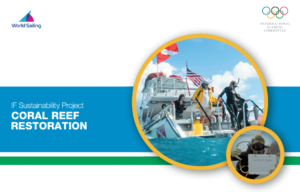
Rising water levels, air pollution and the destruction of biodiversity on land might be at the top of our minds when it comes to climate change, but this is only the tip of the iceberg. Under our oceans, the destruction of the world’s coral reef is something worthy of urgent attention.
Beyond providing natural beauty, coral reefs are of extreme importance to on-land and underwater life. They offer our coastlines a natural protection from damaging wave action and tropical storms, and assist in carbon and nitrogen fixing, a fundamental piece in the fight against climate action.
Moreover, as much as 25% of our marine life depend on them as they provide habitat, shelter and nutrients. An estimated 4,000 fish species rely on them at some point in their existence.
World Sailing's 2020 Hempel World Cup Series Miami was identified by World Sailing as the perfect opportunity to bring education and action together in alignment with the United Nations Sustainability Development Goals (SDGs) and the WS Sustainability Agenda 2030.
In partnership with their title sponsor, Hempel A/S, and the Rescue a Reef programme at the University of Miami (UM), the event managed to collect 250kg of marine litter, and create awareness among hundreds of athletes and volunteers.
BENEFITS
• 250kg of marine litter was removed from a local mangrove ecosystem and 150 corals were out planted.
• Close to 150 athletes and local sailors were engaged in education and action against the impact of climate change.
• The project received positive feedback from the sailors, created a positive impact in the local community and provided sponsors with a new powerful platform to engage with the sailing community.
Click here to download the Case Study




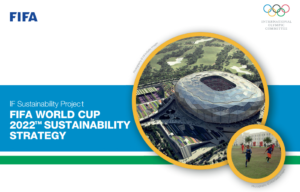
In January 2020, the FIFA World Cup Qatar 2022 Sustainability Strategy was published, with five commitments, 22 strategic objectives and over 70 initiatives. The strategy was developed jointly by FIFA, the FIFA World Cup Qatar 2022 LLC and the Supreme Committee for Delivery & Legacy. This unique tripartite collaboration means that the strategy considers all of the tournament organisers' activities, including those of the host country, and builds on the experience and standards of previous FIFA World Cups.
The strategy was developed in three steps: (1) A thorough analysis of the current context and existing strategies and requirements, then (2) the identification of strategic priorities through a materiality assessment and a human rights salience analysis, with both results eventually combined through an innovative process, and finally (3) the definition of concrete objectives and actions. Throughout this process, FIFA and the organisers engaged with internal and external stakeholders to shape an ambitious, meaningful and robust strategy.
Click here to download the case study











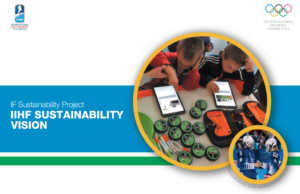
The International Ice Hockey Federation (IIHF) has been actively committed in the pursuit of the United Nations Sustainable Development Goals (SDGs) as an integral part of its sustainability strategy. Aware of the imminent threats of climate change, IIHF has joined the IOC as a participant of the UN Sports for Climate Action Framework and pledged to stop plastic waste as part of the Clean Seas campaign.
In 2020, and five years after the publication of the “IIHF Manual for Sustainable Events”, the federation published a new document portraying the “IIHF Sustainability Vision”, a reflection of the IIHF’s aspirations in regards to sustainability within its organisation, its events and the broader ice hockey family.
The IIHF Vision for Sustainability spans across its different spheres of influence:
- As an organisation the federation follows the premise of “keeping your own house clean”. With the goal of staying as sustainable as possible, IIHF seeks to lead by example including the use of green energy, having a recycling system in place, eliminating the use of single-use plastic bottles and the promotion of water filters, generally taking a continuous improvement approach at the organisational level.
- Member National Associations (MNAs) and stakeholders are encouraged to have their own sustainability strategies responding to their resources and local contexts. The federation recognises best sustainability practices amongst its members since 2019 through its IIHF Sustainability Award.
- IIHF Events are asked to follow the IIHF Manual for Sustainable Events designed to make sustainability an integral, and easy to apply, component of event planning.
However, the manual is not meant as a one-size-fits-all document, but rather a guide that can allow any organiser to be flexible.
BENEFITS
- By creating opportunities to communicate actions by its members and stakeholders, an IF can serve to multiply the effect of positive initiatives by promoting ideas and collaboration.
- The publication of a vision can serve internally as a reference of direction but it can also have external effects. It can create awareness on what is relevant to the organisation and foster relationships with current and potential stakeholders, such as new possible sponsors, which can align and support that vision.
Click here to download the case study








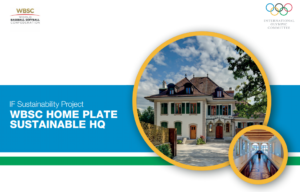
WBSC Home Plate sustainability HQ
The World Baseball Softball Confederation (WBSC) officially opened “Home Plate” on July 2020, its new headquarters in Switzerland, designed with sustainability at its heart. The move follows the merger in 2013 of the International Baseball Federation and the International Softball Federation and the acquisition in 2018 of the building which, after a complete renovation, now hosts its joint federation.
Seeking to leave a positive legacy for its community, sustainability was embedded in every step of the planning, conditioning and intended use of its new headquarters.
Twenty-four roof top photovoltaic panels, with a power output of 12 kilowatts, provide approximately 10% of the building’s electricity needs with the goal of increasing the capacity to cover 100% of its needs by 2025. The underfloor heating and cooling system use hot and cold water to maintain an ideal office climate, whilst all walls have been insulated with high density stone wool allowing temperatures to be maintained for up to 20 hours after the system has been switched off. The same stone wool increases fire resistance and acoustic comfort. All the lighting is made with LED technology and occupancy sensors to keep energy consumption levels to a minimum. The interior Saint-Gobain glass walls and doors feature fire resistant Ei-60 glass - double of the requirement by law.
BENEFITS
- The WBSC now has a sustainable, state-of-the-art permanent headquarters to allow for further, and conscious, growth.
- The new headquarters have significantly improved the working environment and team spirit amongst the staff.
- The sustainability of the building is a source of inspiration to the staff to come up with their own ideas for making their working environment even more sustainable.
Click here to download the case study






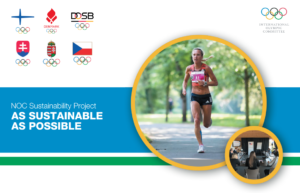
As Sustainable As Possible (ASAP) is a European based, National Olympic Committees’ (NOCs) mentorship and development programme on sustainability matters. Building bridges among organisations, the programme which started in 2020 and will span over a three-year period, is aimed to guide mentees into the creation of integrated sustainability strategies while giving mentors the chance to refine their own.
The ASAP consortium is comprised of six NOCs who will collaborate on a mentorship relationship. The German Olympic Sports Confederation, the National Olympic Committee and Sport Confederation of Denmark and the Finnish Olympic Committee serve as mentors to the Slovak Olympic and Sport Committee, the Hungarian Olympic Committee and the Czech Olympic Committee, who also serves as the coordinator for this project. The programme is co-funded by the Erasmus+ Programme of the European Union, supported by the IOC and is in close cooperation with the European NOC Sustainability Working group that gathers 12 European entities.
OBJECTIVES
The ASAP project was established in order to:
- Build tangible collaborations between NOCs through mentoring.
- Facilitate the path for mentees to create, adapt and implement integrated sustainability strategies in their organisations while mentors can further improve their operations through the sharing of knowledge.
- Build leadership by exemplary sustainability action both in sports and the broader community
Click here to download the case study
Click here for more information about ASAP


